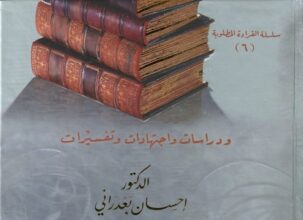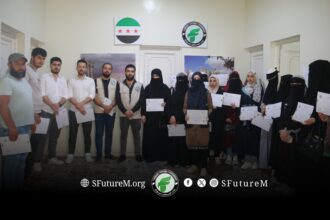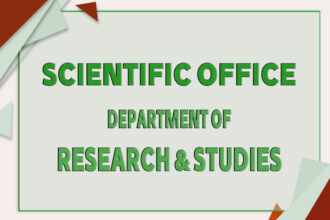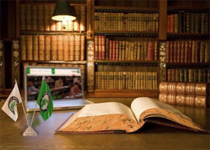Dr. Saad Al-Din Al-BazraIndependent researchersResearch and Studies DepartmentScientific office
National Work Determinants

Confirmation that organizational, theoretical, and intellectual structures are the foundation of any successful effort to overthrow the criminal regime and build an effective alternative system…
I propose the following:
The tasks of national elites in any Syrian national movement are based on four main pillars:
- Political Pillar:
- This involves forming several political and diplomatic teams from Syrian elites capable of negotiating in a political, national language aligned with the revolution’s objectives. The goal is to secure Syrian rights based on mutual interests, equality, and mutual respect, while striving for the self-financing of Syrian elites, avoiding political funding.
- Military and Security Pillar:
- This focuses on forming a professional military and security team from Syrian elites with credibility and nationalism to serve the Syrian revolution. This team should work towards establishing a model national military and an honest security apparatus, adhering to the principles of the Syrian revolutionary movement.
- Civil Pillar:
- This involves forming a team of Syrian social figures from the elite block to achieve the following goals:
- Develop a vision for future Syrian social relations among all components and find appropriate formulas for engaging in Syria’s secure and civilized future.
- Carry out humanitarian and relief work through non-governmental, non-political organizations, coordinated by Syrian elites, free from corruption and waste.
- Support and empower women’s roles in political life and the nation during the transitional and permanent phases.
- Address the younger generations and children with educational and social means that uplift the Syrian human and society towards civilization like others.
- Rebuild the value system in Syrian society using all refined means.
- Experts, Competencies, and Technocrats Pillar:
- The future phase is a critical juncture for Syria after a stagnation period lasting five decades, during which Syrian competencies and experiences were not utilized in productive and effective roles for nation-building. Instead, a policy of oppression rejected qualified individuals. The radical change sought by Syrians involves revitalizing Syria’s potential and managing it with the best methods in line with global developments, relying on Syrians with the necessary expertise and competencies for such tasks and responsibilities. Accordingly, organizing Syrian technocrats is essential at this stage, which can be done on two complementary levels:
- Specialization
- Region
- A legal team with integrity, competence, and diligence to follow up on issues of detained and missing Syrians, demanding visits to Assad’s detention centers by international committees and the unconditional release of women.
- A judicial team to prepare for transitional justice tasks in a highly professional manner and achieve fairness for the families of Syrian victims who died due to the Assad, Iranian, and Russian aggression against the Syrian people.
- A team of educational experts to address the damage suffered by children and youth who were deprived of completing their education, and to develop model plans to build a Syrian character inclined towards creativity and innovation.
- A medical team to follow up on medical affairs inside and outside Syria, and to develop plans and programs to improve the current, transitional, and permanent health conditions.
- A media team to manage the media aspect of the Syrian revolution, transitioning from a chaotic coverage of the revolution’s events to an effective, organized, and professional reality.
- A team to study the conditions of Syrian refugees and expatriates in the diaspora, improve their current and future living conditions, and organize them into effective networks for any upcoming political or humanitarian requirements.
- An engineering team to study the damaged infrastructure in Syria, estimate its value, nature, and distribution, and develop visions, programs, and plans for rehabilitation and reconstruction by professional Syrian elites based on the latest theories.
- A team of experts and scientists specializing in studying and managing water resources, their distribution, and managing Syria’s needs within a decentralized administrative system.
- A team of experts and scientists for studying and managing mineral resources, fossil fuels, their distribution, and covering Syria’s needs within a decentralized administrative system.
- An agricultural engineering team to study the redistribution of agricultural production and achieve Syrian food security within a decentralized administrative system.
- An economic and global trade expert team to develop the best solutions for export and import according to internal, regional, and global changes.
- A team of experts in sustainable development and the biosphere to develop plans for rehabilitating natural resources, addressing the impacts of the war, and correcting the mismanagement of resources that has persisted for 50 years in Syria.
- A team of industrial experts to study the redistribution of industrial production and its integration with both the agricultural and commercial sectors, achieving sustainable development within a decentralized administrative framework.
- A team of higher education experts to address the deterioration in evaluating Syrian certificates, develop university curricula, and improve research as a goal and means to advance all economic and social sectors towards a prosperous society for future generations.
Saad al-Din al-Bazra






